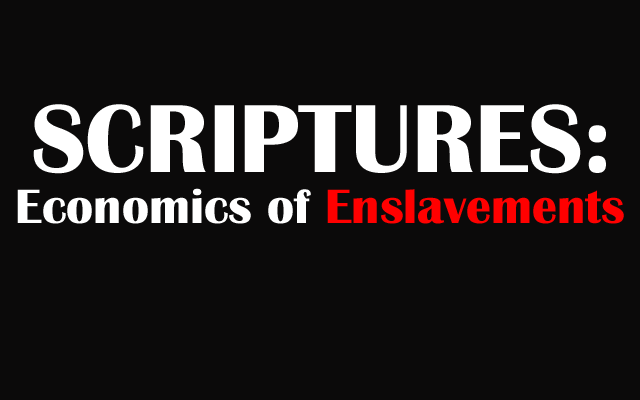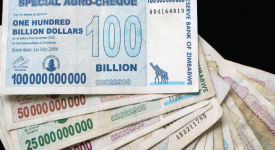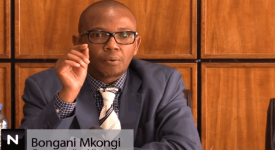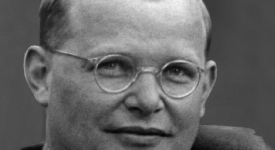In the part one to this piece, we started to look at the strange logic in fundamentalist thinking. In this piece we examine the various ways by which believers think with and make expressions of their desire to implement tenets of their holy books, socially and politically.
I was one of those who used to think that economics is a neutral and innocuous academic subject. I was sore wrong. And for those who still dwell in that rudimentary thinking category, please understand this: numbers like magic and miracles, but they are not magic or miracles. It is about time that Africa deserved leaders with good heads on their shoulders, heads that will comprehend the relevance of geopolitics, not the local enemy-chasing which has kept much of Africa in the rear end of anything significant in international discourses.
The range of believers in divinely inspired texts is colorful. Take christians for example, there is not one bloc of christianity. Often illustrating the effect of the belief factor is the manner in and passion by which it is expressed. The burning heart-desire and fiery evangelism of Christians since the first century can be viewed not as monolithic barriers in the ways of this perduring project to execute divine kingdoms on earth. The cost to life and property and conscience is still counting.
A task that transforms from the plane of social to the evangelical, factoring in political economics of salvation, and binding up the ungracious “free market” system of capitalism and moral enslavement in the name of God defines the confines of human power and spiritual rhetoric. This, I think, is the simple and quotidian origins of the quest to dominate at every cost.
Who would believe that today’s poor continents exit only as a direct consequence of the rich continents’ exploitations? These explotations have left millions of people, through the tied hands and ineptitudes of their governments and leaders, to be dependent on and at the mercy of the international monetary systems with inescapable and permanently burdensome loans.
The International Monetary Fund (IMF) and the World Bank (WB) are two major players when it comes to who and what wrote the scriptures of poverty and economic powerlessness for most of African countries. Average citizen of these poor countries have no clue whatsoever that they disposable puns in the capitalistic game of globalization.
Powerful corporations call it profit. They share the world’s resources– as profits– among themselves and their subsidiaries. The sharing formula does not bring or invite the oppressed of the world to the table, let alone to limelight for some take-away. This is where several versions of the Christian religion take the lead in asking the poor and oppressed Lazaruses of this world to work harder in order that their heavenly gains might be maximized and consolidated eventually, if or when they get to the pearly gates. Meanwhile, they are asked to ensure the gates of hell in this world! A gospel according to the oppressor that is! Ironically, within the drama of the “race not being to the smartest”, the rich is only rich because the poor slaves away for the rich. To assume that there is a named poor, underdog somewhere, not serving the interest of the rich and powerful, is not straight thinking. The poor of the earth, the downtrodden in the power hierarchy, serve the interest and ego of the powerful and rich, every time, everywhere.
But who says power is bad? Who says being wealthy is bad? Both wealth and power are very good, if not excellent stuffs to have. But that is besides the point for the most part. The argument being represented here is simple: there is no such thing as neutral wealth or powerless power. Take the idea of democracy for example. Power in number terms in a democracy could be used through the human agential either for good or ill. A more contemporary, relevant example is how some American leaders have capitalized on the numbers game and on the need to spread democracy and civilization to other parts of the world in order to hoodwink the entire populace and sell their personal agenda. I am thinking the American Senate will one day pass a bill that makes the President or any other persons wielding such power to be more accountable for their actions, even when they are no longer in office. That way, country would not be dragged into unnecessary conflicts. An entire populace don’t have to pay for the crimes of two selfish men. But karma is sometimes blindfolded when it returns with its rewards!
And when it comes to the subject of economic ethics and morals we have to be careful, to prevent the powerful from mass-muting the powerless into non-protestive mode.
In this world, you are either free to act as you like or are a slave to those who reach this status. America’s freedom was bought at a high cost. A free gift from Great Britain did not guarantee America’s liberty. America is “free” today, free to act as it pleases because it is a powerful nation. Power intoxicates. When it is absolutely unchecked power, it drives mad the possessed victim.
Holy writs are those man-made social fittings which convey the solemnization of human power in the affairs of mankind. This is the metaphysics of human politics. Understanding the social formations of these holy writs under the machines run by black Oloibiri-drilled oil in the Niger Delta, where the evangelicalism of corrupt governors qualify them to keep their stolen wealth under military protection in white men’s banks, with service interests for the hosts, is the beginning of wisdom.
Regime interest is convenient. Longevity is assured. While entire populace wallow, condemned to lives of inadequacies or abject lacking, purveyors of mankind’s woes lavish away in wealthy confines of a mansion in Pakistan’s Islamabad, or a nice comfy little town in Amassoma or Abeokuta. After all, Wilheim Leibniz, the man-theologian said that this world is the best possible. We better believe him since he enjoyed his entire life in merriment, affluence and power.








